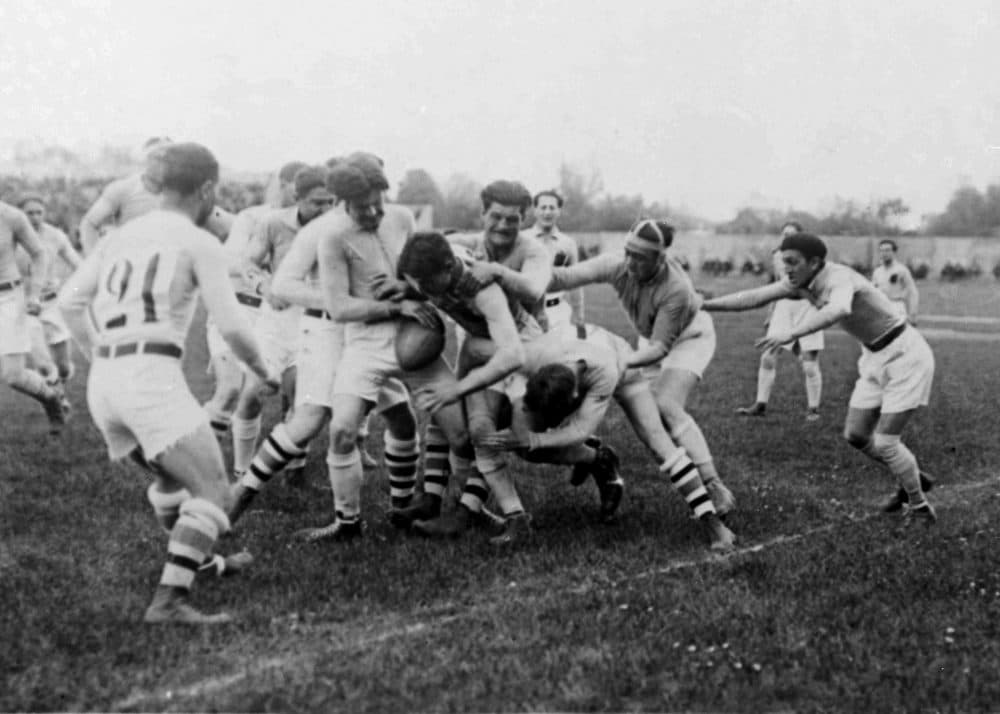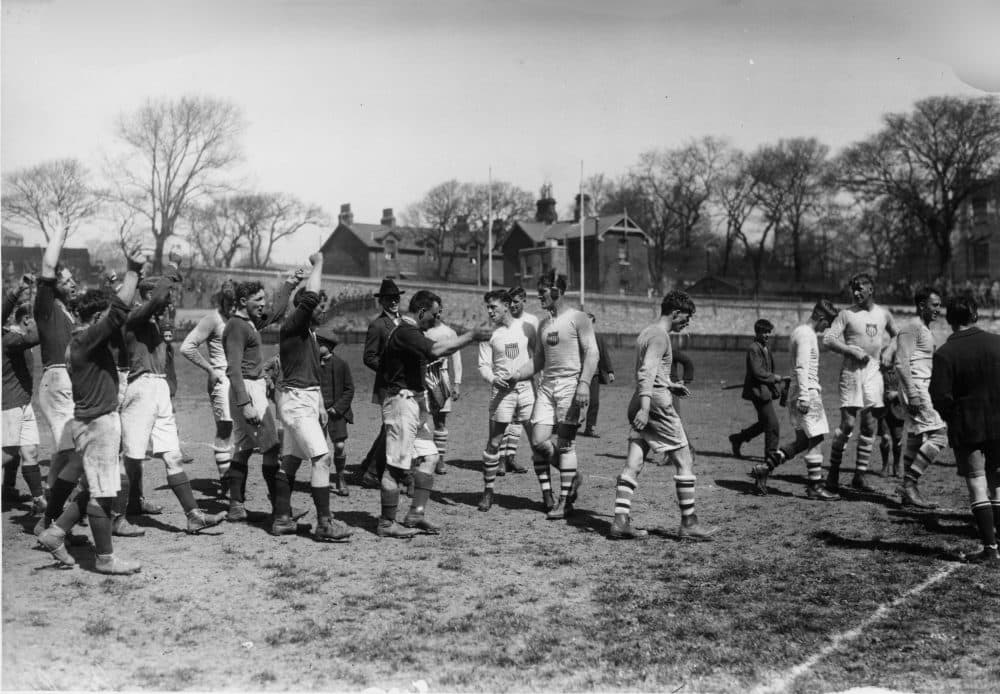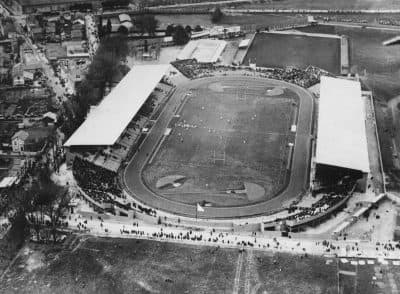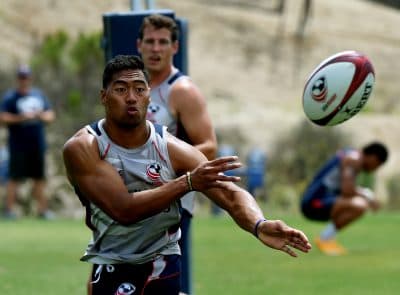Advertisement
After 92 Years, The United States Still Holds The Olympic Rugby Crown
Resume
The United States is the defending Olympic rugby champion. Let that sink in for a bit.
The U.S. wasn't known for playing rugby back in 1924, any more than it is today.
And yet, the United States is the defending rugby champion. But this isn't just a David vs. Goliath story. This is also a story about the turbulent times between world wars, as two countries that had fought on the winning side squabbled over how to treat the losers.
But back to rugby. Right after the turn of the 20th Century, rugby was briefly more popular than American football — at least in the state of California.
"Stanford and California abandoned American football after--I think it was 1906--because during the previous season there had been nineteen casualties in football," Norman Cleaveland, a Stanford graduate who played on the 1924 Olympic team, said in an oral history held by the Bancroft Library in Berkeley, California. "The game had gotten so rough, and there was not adequate protection."
Rugby was already on its way out when the U.S. team won Olympic gold at the 1920 Games in Antwerp. After World War I, American college athletes would play American football, dangers be damned.
And by 1924, when the Olympics would be held in Paris, finding American athletes with competitive experience at the sport was difficult. Even so...
"France, whom the United States defeated for the title in 1920, was very insistent that the titleholder enter a team so that she might be given the opportunity to remove the laurel wreath from the crown of her dear brothers from the U.S.A," wrote Dudley DeGroot.
DeGroot died in 1970. But his account of his time with the Olympic rugby team was printed by The Call newspaper over 23 days starting in July, 1924.
"They were looking for a punching bag," Cleaveland told rugby expert Mark Jenkins. "We were told to go to Paris and take our beatings like gentlemen."
An Olympic Committee Plays Favorites
If France had one "guaranteed" gold in the 1924 Olympics, it was in rugby. But, just to make sure, Olympic organizers scheduled the games for two months before the rest of the events, at a time when French rugby players would be in top form. That put the Americans on a tight schedule.
A few of the players from 1920 decided to return to the team, and open tryouts filled out the roster. All of the players came from California, and they had all played more American football than rugby.
In early April, the team made their way to New York and set sail on the S.S. America, bound not for Paris, but for England, where they would play practice matches against English teams — considered by many to be the best in the world.
"Certainly any group of Americans had a great deal of nerve to travel some 6000 miles to play the greatest English teams at a game which in every sense of the word is English," DeGroot wrote. "But how much greater (or foolish) that nerve when it is considered that American team had never played a game, as a unit. Nor had any of the members of the team played rugby for four years, while eight of them had never played a game in their lives. And in spite of our confidence in ourselves we often wondered whether we had not undertaken something a little bit bigger than we could handle."

A Tournament Of Three
OK, so you might be wondering — if England was the best in the world at rugby, why wasn't Great Britain sending a team across the channel to the Olympics? I mean…easy trip, right?
In DeGroot's journal, he asks the same thing. And Great Britain wasn't the only team that didn't attend. The only two countries that agreed to face France in the Olympic rugby tournament were the United States and Romania.
Everyone else stayed home, not because they were afraid to face the French team.
They were afraid of the French fans.
But I'm getting ahead of myself. Our plucky American rugby team lands in England, where they get a good drubbing from two of the great English rugby teams. And then, after six days, it's time to board another boat.
"Rough, oh, I've never been on such a rough ride," Cleaveland said in his oral history. "We were seasick and we felt battered around. Well, the French had goofed off, and they hadn't told the officials in Boulogne that we were coming. So they said we couldn't get off the boat, we didn't have any visas. So we said, 'That's what you think. You watch us, see if we get off this boat.' We charged through the gendarmes and through the barriers. The next morning, the Paris papers featured the 'Big riot in Boulogne.' Oh, we were really taken apart in the press."
The rugby players settled into their hotel in Paris — the athlete's village wasn't ready yet — and started preparing for the three game tournament. First up, France v. Romania. The American team watched that one from the stands.
"The final score of that game, if game it could be called, was 61 to 8 in favor of France," DeGroot wrote. "We left the field fully realizing just what we were up against. A decidedly sober bunch of Americans, trying to figure out just how were going to stop that French backfield."
That France would beat Romania was a surprise to no one. The tournament had been scheduled so that the U.S. and France would likely both have one win (over Romania) before they met in the last game of the series.

So, it should have been a surprise to no one that when the U.S. played Romania, the fans were decidedly anti-American.
"To say that the French spectators were unsportsmanlike at that game would be putting it far too mildly," DeGroot wrote.
The French Olympic committee agreed. In the days before the final, they published an appeal in a local newspaper for civility in the wake of the "violent sentiments" shown by French fans. "The Americans play hard," the committee admitted, "but never brutally or with bad intent. The Californians who have come over 12,000 kilos to play a sport which is not theirs should have the applauds and the feeling of the French sporting public."
"It is hard to conceive of a nation so unsportsmanlike that such an appeal is necessary," Dudley DeGroot wrote. "But it is harder still to try to understand how the people of the French nation could be so hostile to representatives of a country which had so recently saved them from almost certain destruction."
Rugby — and rugby fans — would take the blame for the events that followed, but there was a subtext here. Not only did Americans, like DeGroot, feel that the French owed the U.S. a debt of gratitude, but there was a feeling among the French that the U.S. and Great Britain had abandoned France — at least financially — after the war.
That Fateful Final
All of that was in play when, on a blisteringly hot and humid Sunday in May, 40,000 fans packed Colombes stadium in Paris.
"As we were standing at attention during the playing of our anthem, the storm which had been threatening all day broke loose with a tremendous clap of thunder and burst of lightening, which enhanced the majesty of the scene many times," DeGroot wrote.
"The odds were five to one against us," recalled Cleaveland. "We really had our dander up. A lot of things we knew about by playing American football the French were yet to learn.
"They started beating up Americans in the stands. This was during the game. The only way they could get the injured Americans into an ambulance was to bring them onto the field. We thought that some were dead, and we thought that it was only a matter of time before we would be dead, also."
"They did most of their tackling around the neck and shoulders. Consequently when we left our feet and hit them low, it simply laid them out," DeGroot explained. "The French fullback was a particularly dirty player, persisting in putting his cleated foot in your face. We soon found by tackling him hard and low on the one leg he kept on the ground, he soon got over this. From that time on that fullback couldn't kick the ball when he got it to save his life."
"Oh, we gave them a waxing," Cleaveland wrote. "But they started beating up Americans in the stands. This was during the game. The only way they could get the injured Americans into an ambulance was to bring them onto the field. We thought that some were dead, and we thought that it was only a matter of time before we would be dead, also. But anyway, we won, 17-3."
After the game, the French crowd only got more unruly.
The headline in the San Francisco Examiner the next day read, "French Boo U.S. Anthem." But, in France, a different narrative altogether started to emerge.
"The French newspapers switched sides, changed their role 180 degrees, and we became great heroes," Cleaveland wrote. "And Paris, I can assure you, is one of the best places in the world to be a hero."

Norman Cleaveland stayed behind for a while to enjoy being a hero in Europe. Dudley DeGroot got to work on his 21-part journal for The Call. He ended, not on a note of reconciliation, but on one that questioned whether the Olympics should be held at all:
"Where will it end? Certainly the French need to be taught true sportsmanship, which is one of the objects of the Olympic games, but such a thing seems to be an impossibility."
The Modern Game Emerges
Rugby Sevens, the game that will be played in Rio, is faster-paced and higher-scoring than the game of fifteens that DeGroot and Cleaveland played. And rugby's popularity is on a worldwide upswing. Neither France nor the U.S. is expected to medal at these games. But wouldn't it be cool if the U.S. team entered the first Olympic rugby tournament since 1924 as an underdog…and came out champions?
Nah ... that would never happen. Would it?
Thanks to Walter Dixon and Mark Baumhardt for lending their voices to the words of Norman Cleaveland and Dudley DeGroot for the audio version of our story. And thanks also to Mark Jenkins and Dave Scholz for sharing their research on the 1924 U.S. Olympic Rugby Team.
This segment aired on August 6, 2016.
